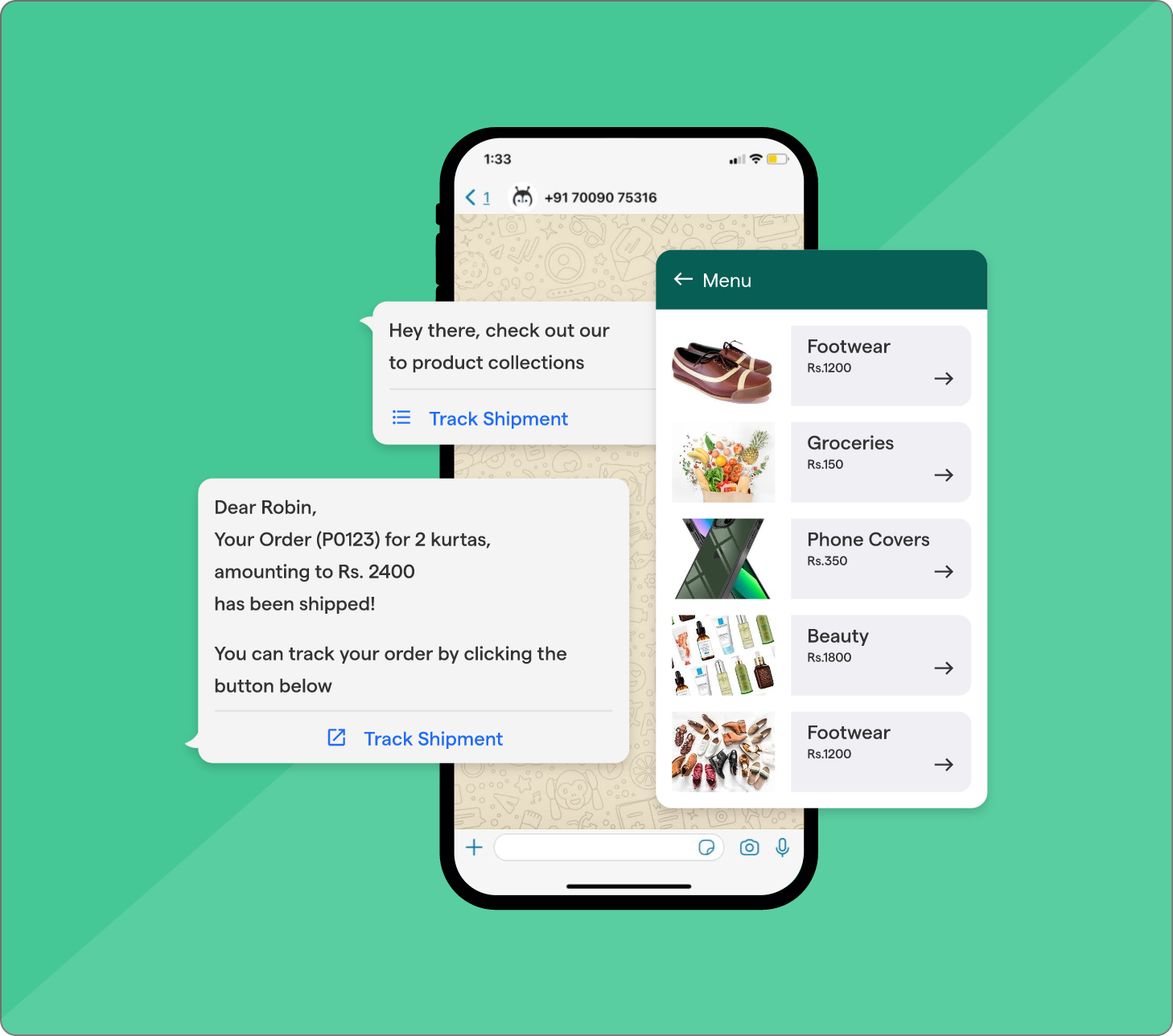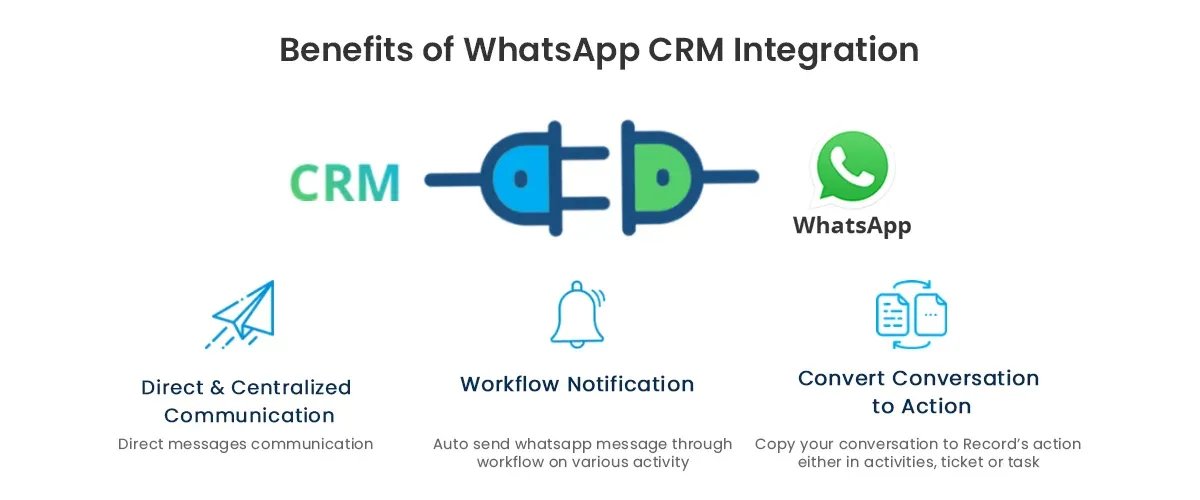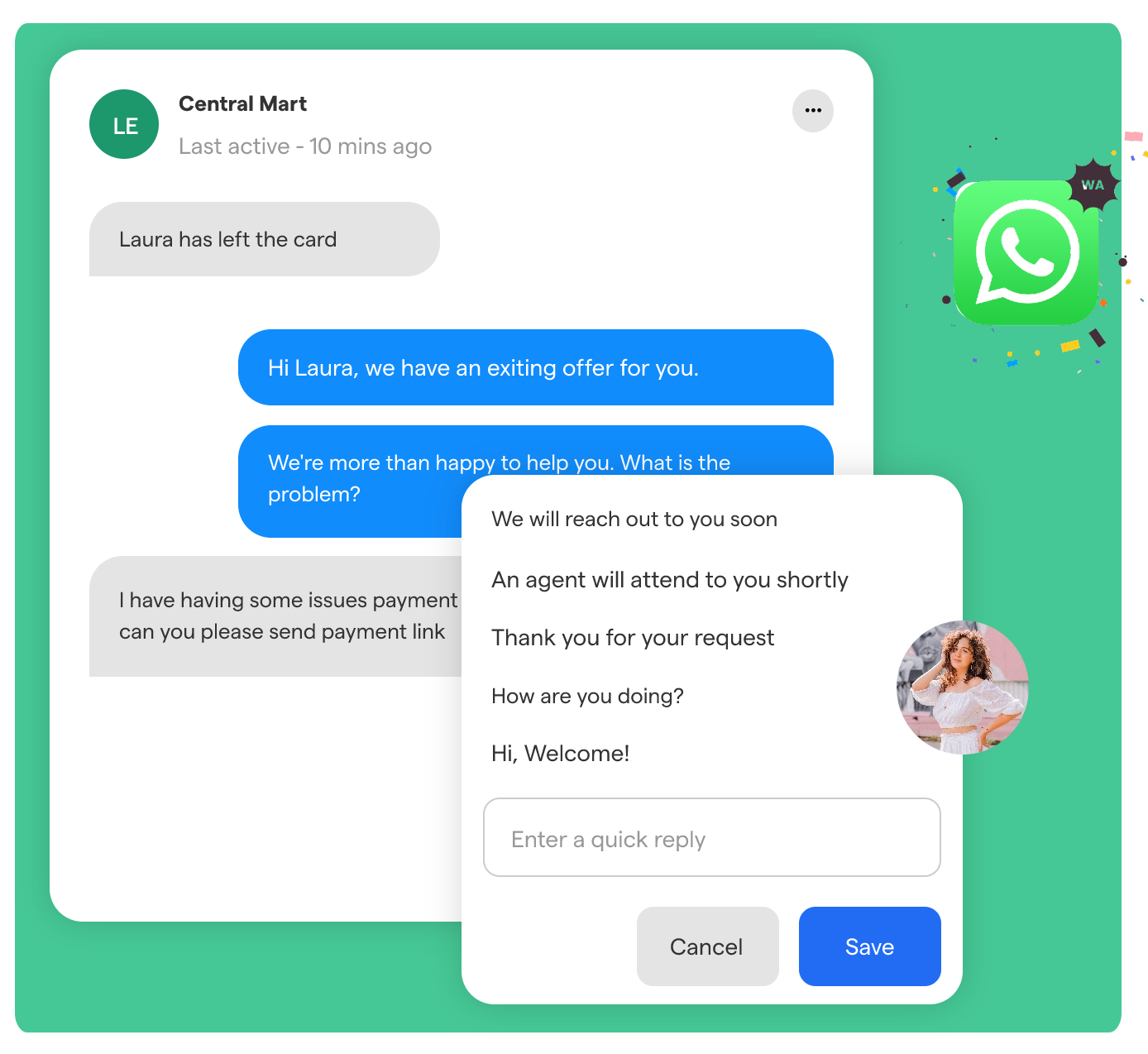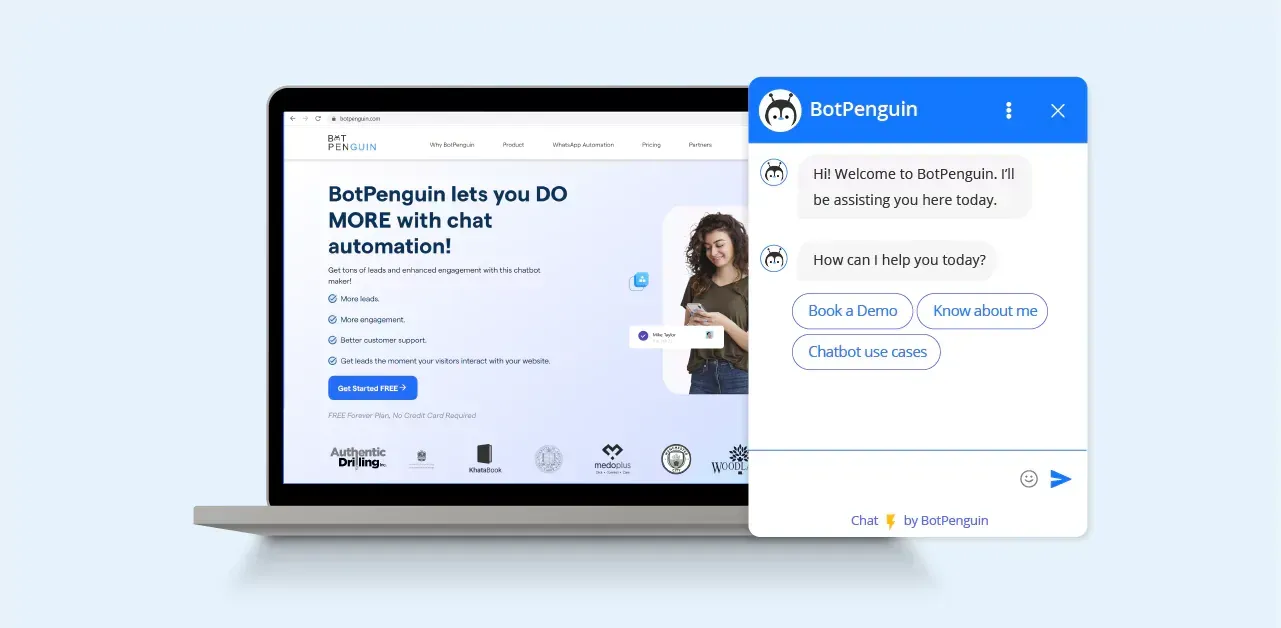As business owners, doesn't it seem like sometimes the channels to reach customers are endless and ever-expanding?
It can feel overwhelming.
But what if we told you one of the world’s most popular apps, WhatsApp, could streamline your communication process effectively? Interesting, right?
Engaging with your audience on a daily platform is the future of business communication.
But hold on, how do you manage inquiries or provide service over messages while running an enterprise?
That's where WhatsApp integrations step in. This blog will dive into how these integrations work and the huge impact they can bring to your business.
Read on to learn how to simplify communication, improve customer engagement and boost your business growth, one WhatsApp message at a time.
Understanding WhatsApp Integrations
WhatsApp integrations have become increasingly important for businesses looking to enhance their communication strategies.
In this section, we will explore the fundamental concepts of integrations on WhatsApp and the available types and provide examples of how businesses can leverage these integrations effectively.
The Fundamental Concepts of WhatsApp Integrations
WhatsApp integrations involve connecting and integrating the messaging app with other business systems or platforms.
This seamless integration allows businesses to enhance communication, automate processes, and maximize efficiency. It enables businesses to leverage the existing capabilities of WhatsApp and integrate them into their infrastructure.
By integrating WhatsApp with their systems, businesses can access features such as messaging, voice calls, file sharing, and more. This integration allows enhanced customer support, improved internal collaboration, and streamlined marketing and sales processes.
Different Types of Integrations Available
Various types of integrations on WhatsApp are available, each serving a different purpose for businesses. Here are some common types:
Chatbot Integrations: Chatbots integrated with WhatsApp enable automated customer responses and interactions. These bots can handle frequently asked questions, provide product information, and even assist with transactions.

CRM Integrations: Integrating WhatsApp with Customer Relationship Management (CRM) systems allows businesses to track and manage customer interactions effectively. It enables a seamless flow of communication between the CRM platform and WhatsApp.

Payment Gateway Integrations: For businesses that offer products or services, integrating payment gateways with WhatsApp allows customers to make transactions directly within the app. This integration simplifies the purchasing process and provides a convenient user experience.
How Businesses Can Utilize WhatsApp Integrations?
WhatsApp integrations offer a range of possibilities for businesses across various industries. Here are a few examples of how businesses can effectively utilize these integrations on WhatsApp:
E-commerce: Online retailers can integrate WhatsApp with their website or e-commerce platform to enable real-time customer support, order tracking, and personalized product recommendations.
Customer Support: Businesses can integrate chatbots with WhatsApp for automated responses, helping customers with common queries and providing 24/7 support.
Sales and Marketing: Marketers can integrate WhatsApp with their CRM to send personalized marketing messages, engage with leads, and nurture customer relationships effectively.
Internal Communication: Within an organization, integrating WhatsApp with project management tools or collaborative platforms allows teams to communicate and coordinate seamlessly, regardless of their physical location.
Benefits of WhatsApp Integrations
Incorporating WhatsApp integrations into business communication strategies can bring a multitude of benefits.
This section explores how integrating WhatsApp enhances customer communication and support, streamlines team collaboration, improves marketing and sales strategies, and ultimately boosts overall efficiency and productivity.
Enhancing Customer Communication and Support

By integrating WhatsApp into customer communication and support channels, businesses can provide customers with a seamless and convenient experience.
Here's how:
Real-time assistance: With integrations on WhatsApp, businesses can offer instant responses to customer inquiries, ensuring faster query resolution and improved customer satisfaction.
Multimedia support: WhatsApp allows the exchange of various media formats, enabling businesses to share images, videos, documents, and other relevant content with customers, enhancing communication clarity.
Automated updates: Incorporating chatbots with WhatsApp integrations enables businesses to automate frequently asked questions, updates, and order tracking information, providing customers with timely and accurate information.
Streamlining Internal Team Collaboration
WhatsApp integrations benefit customer-facing aspects and streamline internal team collaboration.
Here's how businesses can leverage this integration for improved teamwork:
Instant communication: WhatsApp provides a platform for instant messaging and group chats, allowing teams to collaborate in real-time, share information, and quickly address urgent matters.
File sharing and feedback: Integrating WhatsApp with project management or collaboration tools lets teams share files, receive feedback, and discuss project progress efficiently, keeping everyone on the same page.
Virtual meetings and conferences: WhatsApp's voice and video call capabilities enable businesses to conduct virtual meetings, reducing the need for physical meetings and facilitating remote collaboration.
Suggested Reading:
How WhatsApp Integrations can Improve Your Customer Service?
Improving Marketing and Sales Strategies
Integrating WhatsApp into marketing and sales strategies can greatly enhance outreach efforts, lead nurturing, and overall customer engagement. Here's how businesses can leverage integrations on WhatsApp for improved marketing and sales:
Personalized communication: WhatsApp allows businesses to send personalized messages, promotions, and offers directly to customers, fostering a more personalized and targeted marketing approach.
Interactive campaigns: With WhatsApp integrations, businesses can create interactive campaigns where customers can actively engage, respond, and provide feedback, enhancing brand interaction and building loyalty.
Sales conversions: By integrating WhatsApp with CRM systems and sales tools, businesses can streamline lead management, track customer interactions, and guide leads through the sales funnel effectively.
Boosting Overall Efficiency and Productivity
WhatsApp integrations can significantly boost overall efficiency and productivity within an organization.
Here's how businesses can leverage this integration to their advantage:
Centralized communication: By centralizing communication on one platform, businesses can reduce email clutter, minimize information loss, and improve overall communication flow.
Automation and reminders: Integrating WhatsApp with task management or workflow automation tools allows businesses to automate reminders, notifications, and task assignments, ensuring timely execution and reducing manual workload.
Quick decision-making: Real-time collaboration and instant messaging capabilities enable faster decision-making, helping teams respond swiftly to changes, collaborate on problem-solving, and deliver results.
Implementing WhatsApp Integrations
Integrating WhatsApp into your existing business systems can greatly enhance communication and improve overall efficiency. This section explores the key steps involved in implementing integrations on WhatsApp, including researching and choosing the right integration tools, the step-by-step process of integration, and best practices for a successful implementation.
Researching and Choosing the Right Integration Tools
Before integrating WhatsApp into your business systems, it is crucial to research and select the right integration tools that align with your specific requirements. Here are some key considerations:
Functionality: Evaluate integration tools based on their features and capabilities. Ensure they can seamlessly integrate WhatsApp with your existing systems, such as customer relationship management (CRM) software or project management tools.
Compatibility: Check the compatibility of the integration tools with your business systems. Ensure they support the platforms and versions you currently use to avoid technical issues or compatibility gaps.
Security and Compliance: Consider the integration tools' security measures and data privacy features. It is essential to choose tools that prioritize protecting customer and business information and comply with relevant regulations.
And taking your first step toward WhatsApp chatbot integration isn't that tough. Meet BotPenguin- the home of chatbot solutions. With all the heavy work of chatbot development already done for you, move forward to setting up a top-notch WhatsApp chatbot for your business with features like:
- Marketing Automation
- WhatsApp Automation
- Customer Support
- Lead Generation
- Facebook Automation
- Appointment Booking

Step-by-Step Process of Integrating WhatsApp with Existing Business Systems
Once you have chosen the right integration tools, follow these steps to integrate WhatsApp into your existing business systems successfully:
Create a WhatsApp Business Account: Set up a WhatsApp Business Account if you haven't already. This will allow you to use WhatsApp's business features and functionalities.
Choose an integration Platform: Select the one that fits your needs. This could be a third-party integration tool or a custom-built solution, depending on the complexity of your requirements.
Configure Integration Settings: Connect your WhatsApp Business Account with the integration platform by configuring the settings. This involves providing authentication details and linking the account with your existing systems.
Map Data and Workflows: Define how data will flow between WhatsApp and your existing systems. This may include mapping customer information, message logs, and other relevant data to ensure seamless integration.
Test and Verify Integration: Thoroughly test the integration to ensure it functions as expected. Test features such as message delivery, data synchronization, and customized functionalities specific to your business.
Train and Educate Employees: Provide training and education to employees using WhatsApp as part of their daily workflows. Ensure they understand how to use the integrated system effectively and follow best practices for customer communication.
Best Practices and Tips for a Successful Implementation
To ensure a successful implementation of WhatsApp integrations, consider the following best practices and tips:
Plan and Set Clear Objectives: Clearly define the goals and objectives you aim to achieve through WhatsApp integration. Set realistic expectations and establish measurable benchmarks to track the success of the implementation.
Start Small and Scale: Begin with a pilot project or a limited scope to validate the integration and gather feedback. Once you have fine-tuned the integration and resolved any initial challenges, gradually scale up the implementation according to your business needs.
Regularly Monitor and Optimize: Continuously monitor the WhatsApp integration's performance and collect user feedback. Regularly review and optimize your workflows and processes to improve efficiency and maximize the benefits of the integration.
Ensure Proper Governance: Establish guidelines and policies for using WhatsApp within your organization. This includes defining communication standards, data handling protocols, and guidelines for appropriate use to maintain consistency and compliance.
Stay Up to Date: Keep track of updates and new features introduced by WhatsApp and your chosen integration tools. Regularly update your systems to leverage the latest enhancements and ensure compatibility with future releases.
Following these best practices and tips, you can successfully implement WhatsApp integrations into your existing business systems, enhancing communication efficiency and overall productivity.
Now, let us see how to overcome challenges and concerns.
Suggested Reading:
Overcoming Challenges and Concerns
Implementing WhatsApp integrations can bring numerous benefits to businesses. However, like any new technology, there may be challenges and concerns.
This section focuses on overcoming three key areas of concern: security and privacy, potential technical issues, and user adoption and resistance.
Addressing Security and Privacy Concerns
Securing sensitive data. Protecting privacy. Remaining compliant. These crucial concerns can make businesses hesitate about WhatsApp integration.
But with the right strategies, you can integrate securely - enabling communication while also keeping your customers' data locked down tight.
Read on to learn how.
Data Encryption: WhatsApp uses end-to-end encryption, ensuring that messages and calls are secured and can only be accessed by the intended recipients. This encryption provides an added layer of security and protects sensitive information from unauthorized access.
Privacy Settings: WhatsApp allows users to control their privacy settings, such as choosing who can view their profile information and setting up two-step verification for an extra layer of account protection.
Compliance with Regulations: Implementing WhatsApp integrations should be done in compliance with relevant data protection and privacy regulations, such as the General Data Protection Regulation (GDPR) in the European Union. Businesses should review and adhere to these regulations to ensure the proper handling of customer data.
Handling Potential Technical Issues and Limitations
WhatsApp integration not working smoothly? Are technical hiccups slowing you down? Don't let tricky compatibility, syncing, or performance issues botch your integration.
We've got solutions. Read on to learn expert tips for tackling these potential pitfalls head-on. You'll be avoiding integration errors and optimizing systems in no time.
Integration Compatibility: Ensure the chosen integration tools are compatible with your existing systems. Incompatibility can lead to technical issues and hamper the smooth integration process. Thoroughly test the compatibility of the integration tools with your systems before implementing the integration.
Synchronization and Data Loss: There may be challenges in synchronizing data between WhatsApp and your existing systems due to differences in data formats or limitations of integration tools. Regularly backup data and implement appropriate measures to minimize the risk of data loss during synchronization.
Volume and Performance: Depending on the scale of integration and the volume of incoming messages and data, technical issues related to performance, such as delays in message delivery or system response times, may arise. Monitor system performance closely and optimize resources to ensure a smooth user experience.
Strategies for Managing User Adoption and Resistance
Getting team buy-in for new technology can be tricky. But with the right strategies, you can turn WhatsApp integration skeptics into enthusiastic adopters.
Learn how effective communication, training, and feedback can smooth the transition and drive user adoption. Don't let resistance hold your integration back - empower your team for success instead!
Engage in Effective Communication: Communicate the benefits of WhatsApp integrations to employees and stakeholders. Highlight how it will enhance communication and streamline processes. Address any concerns and clarify misconceptions to create a positive mindset towards integrations on WhatsApp.
Training and Support: Provide comprehensive training and ongoing support to users regarding the features and functionalities of WhatsApp integrations. This will help build confidence and competence in using the integrated systems, reducing resistance and increasing adoption rates.
Pilot and Feedback: Start with a pilot project involving a small group of users. Gather feedback from this initial deployment to identify any usability issues or areas for improvement. Incorporate this feedback into the broader implementation plan to enhance the user experience and address concerns.
Incentives and Recognition: Offer incentives or recognition for users who actively adopt and embrace the WhatsApp integration. This can encourage adoption and create a positive culture around the new communication tool.
Continuous Improvement: Continuously seek feedback and monitor the usage of the integrated systems. Regularly evaluate the effectiveness of the integration and make necessary improvements based on user feedback and evolving business requirements.
Businesses can overcome challenges associated with integrations on WhatsApp by addressing security and privacy concerns, managing potential technical issues, and implementing strategies for user adoption and resistance.
With proper planning, communication, and support, organizations can leverage the benefits of this popular messaging platform while ensuring a secure and efficient communication channel within their workflows.
Conclusion
WhatsApp integrations allow businesses to connect the popular messaging app with their existing systems, unlocking powerful communication capabilities.
By integrating WhatsApp into workflows, companies can enhance customer support through real-time messaging, automate responses with chatbots, and improve internal collaboration with seamless messaging.
The benefits are clear - more efficient communication, higher customer satisfaction, and streamlined operations.
To fully leverage these advantages, businesses need an expert integration partner. This is where BotPenguin shines. With robust WhatsApp integration capabilities tailored to your needs,
BotPenguin can help you transform communication and take your business collaboration to the next level. Unlock the potential of WhatsApp to connect with customers and empower teams like never before.
The future of business communication is here - let BotPenguin guide you.
Suggested Reading:
Frequently Asked Questions (FAQs)
How can businesses set up WhatsApp integration effectively?
Platforms like BotPenguin offer user-friendly interfaces, simplifying the setup process for seamless integrations on WhatsApp.
Can WhatsApp integrations automate customer support?
Absolutely, they automate responses, FAQs, and inquiries, optimizing customer support efficiency.
Is WhatsApp integration cost-effective for businesses?
While WhatsApp Business APIs may have associated costs, the benefits in customer engagement and streamlined communication often outweigh the expenses.
What industries benefit most from WhatsApp integrations?
Industries like e-commerce, healthcare, travel, and finance leverage WhatsApp for customer interactions, service updates, and support.
Can WhatsApp integrations replace traditional communication channels?
While it enhances communication, it often complements existing channels, providing an additional avenue for customer interaction.
Are there regulations businesses need to consider for WhatsApp integrations?
Businesses must adhere to data protection and privacy laws when using WhatsApp, ensuring compliance with regulations like GDPR.


